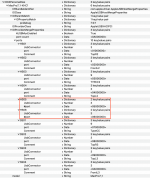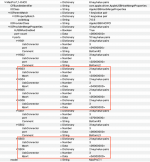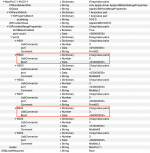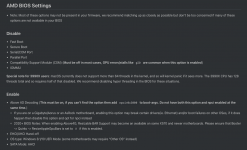Any ideas on why waking from sleep crashes my computer and requires a CMOS reset to boot?
I’ve had intermittent sleep issues ever since I first started in OC 6 era, where often waking from sleep would crash the computer (only in macOS) and require a CMOS reset to boot. This happened so often that I installed a switch to make shorting the pins easier. I eventually figured out that it wouldn’t crash as often if I woke the computer by pressing the power button on the case instead of tapping the keyboard/ mouse. I’ve tried to do USB mapping with several methods, but none seem to help (or I’ve not done it correctly).
After upgrading my monitor and using a different usb hub / switch, I suddenly stopped having these crashes for several months on OC 8.3. Thinking that the new hardware had solved the issue, I decided to upgrade my 3900x to a 5950x and get the machine ready for Ventura/ Sonoma. As soon as I updated my BIOS (and updated all OC-safe bios settings) the crashes came back. I decided to move forward with the CPU and OC update, thinking maybe the newer OC 9.3 would work better with the newer BIOS, but no luck.
I’ve lurked here enough to know that often a single setting can make all the difference (hopefully!). Though my best guess is that I need something more robust than the generic SSDT-EC-USBX-DESKTOP.aml, but I am really struggling to understand the SSDT process. I would be so grateful for any suggestions. Specs and EFI below. Thank you!
Hardware
Bios version 2.20.1271
Monterey 12.6.8
BIOS Settings - Disabled
I’ve had intermittent sleep issues ever since I first started in OC 6 era, where often waking from sleep would crash the computer (only in macOS) and require a CMOS reset to boot. This happened so often that I installed a switch to make shorting the pins easier. I eventually figured out that it wouldn’t crash as often if I woke the computer by pressing the power button on the case instead of tapping the keyboard/ mouse. I’ve tried to do USB mapping with several methods, but none seem to help (or I’ve not done it correctly).
After upgrading my monitor and using a different usb hub / switch, I suddenly stopped having these crashes for several months on OC 8.3. Thinking that the new hardware had solved the issue, I decided to upgrade my 3900x to a 5950x and get the machine ready for Ventura/ Sonoma. As soon as I updated my BIOS (and updated all OC-safe bios settings) the crashes came back. I decided to move forward with the CPU and OC update, thinking maybe the newer OC 9.3 would work better with the newer BIOS, but no luck.
I’ve lurked here enough to know that often a single setting can make all the difference (hopefully!). Though my best guess is that I need something more robust than the generic SSDT-EC-USBX-DESKTOP.aml, but I am really struggling to understand the SSDT process. I would be so grateful for any suggestions. Specs and EFI below. Thank you!
Hardware
- ASUS Pro WS X570-Ace
- Ryzen 5950x
- Powercolor Red Dragon 6800
- Corsair Vengeance LPX 3200 64GB (16x4)
- EVGA Supernova 850W Titanium
- WD SN850 1TB (Monterey)
- WD SN770 2TB (Windows 11)
- Intel 660P 2TB in Angelbird PCIE Adapter
- Micron 8TB sata ssd
- Laird BT85x USB Bluetooth module - Cypress CYW20704 A2 chipset (only use occasionally)
- FiiO K3 USB DAC
- Cable Matters USB 2.0 Switch hub (for sharing kb & mouse)
Bios version 2.20.1271
Monterey 12.6.8
BIOS Settings - Disabled
- Realtek LAN Controller
- USB power delivery in Soft Off state (S5)
- Serial Port
- Legacy USB Support
- Launch CSM
- Fast Boot
- Resize BAR Support
- Precision Boost Overdrive
- Core Performance Boost (enabled when needed)
- ErP Ready
- Power on by PCI-E
- Power on by RTC
- Intel LAN Controller
- Above 4G Decoding
- OS Type - Windows UEFI mode
- XHCI Hand-off
Last edited:






